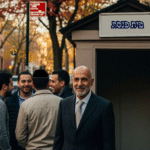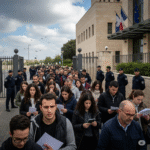“Europe? Who does a post-army trip to Europe?” the security screener scolded me. She allowed herself to stray from the standard questions after remembering we’d once been in the same grade. I, for my part, didn’t remember—and honestly, didn’t care. Go ahead, you lot: climb mountains, haggle at Thailand’s night market, wonder whether that’s a man or a woman, and pretend you’re fascinated by Inca culture in South America. Meanwhile I’ll do a European rail trip—like hordes of young Americans dream of doing.
“Dori Matanya,” she said, leaning on the d. “Have fun. Bring me a doll from EuroDisney,” she finished, and waved me on.
Onward to check-in—that place where carts groan under mountains of luggage and excited people clutch passports as if that’s the thing that will save them, all standing and waiting.
A few minutes later I’m sunk into one of the terminal lounge chairs. People come and go: some pounce on duty-free as if they’re giving things away; others stare at their little screens and hope the Wi-Fi will connect.
She looks as lonely as I am—dark-haired, tiny, for some reason reminding me of Asian girls. After giving up on her phone she starts staring into space. “Where are you flying?” I hear myself mumble.
“Sorry, I don’t speak Hebrew,” she answers in English, with a heavy accent. “I’m from Germany. I came to travel in Israel, and now I’m heading home.”
“I’m going the other way—flying to Sweden now, then continuing on to a few more countries.”
“Wow, you’ll have fun. Europe’s great for hopping between countries. Well—have a good trip.”
She tries to end the conversation—but I feel there’s more to be had. That this isn’t finished.
“What’s your name? I’m Dori.”
“I’m Margaret.”
“Can I buy you a cup of coffee?”
“No, thanks. I’ve had enough Israelis.”
With that, I’m left without answers. Which Israelis managed to hurt her like that? And why does she think that just because we’re from the same place—I’m guilty too? Why don’t I get credit for who I am—Dori Matanya? Why am I serving a sentence for the mistakes and actions of others? She moves away—and so do I.
We board through the jet bridge. Like sheep—but this time not to the slaughter—we file into the flying sardine can. “Would you like a newspaper, blanket, or pillow?” No, no, and no. I don’t want anything. I want to disconnect from everything and head somewhere no one knows me.
Part II
Stockholm looks like a good place to start: not the wildest, not the most interesting—but still classic Europe. In my pocket I have the address of a guesthouse—and that’s about all I know. This is a trip without Lonely Planet: you don’t have to see every historic site, and there are no “must-sees.” You arrive, you feel—and you move on.
The guesthouse, My Friends, turns out to be perfectly decent: made beds, a fairly clean floor, and people who look like young travelers look. I registered, paid, and claimed the corner bunk. From now on—this is home in Stockholm.
A group of Brits is playing cards in the lobby, but they’re not allowed to drink beer—which keeps them pretty quiet. Apparently if there’s no alcohol in the bloodstream, it’s hard for them to string together an interesting sentence.
“Where are you from?” one of them breaks the ice.
“Israel. Just got in.”
“Wow—the Holy Land. Must be special to live there.”
“Not really. London and Tel Aviv don’t seem that different to me.”
“Can’t be. You’ve got loads of news there—doesn’t seem as boring as with us.”
“It’s not like on TV. In the end we have regular lives; we like football too.”
“Yeah! I even know Yossi Benayoun—he’s one of yours, right?”
“Yes. He was the national team captain—good player.”
“Well, he’s passé now. Send us someone new,” he laughs.
I left the group and went to wander the city. When you drift around Europe you feel different: the buildings are built a certain way, people dress a notch nicer, and in general there’s something else in the air. Or maybe that’s just a trick: maybe they’re exactly like us—just with better style. I blend into the crowd: no one knows me—and I know no one. It’s the best feeling in the world.
People may look different—but the global current reaches everyone: McDonald’s, H&M, Zara, Apple. All the stores are here, giving tourists a sense of home. Instead of trying local salmon, what’s easier than ducking into McDonald’s for a burger and fries? That’s exactly what these companies bank on: we won’t take risks; we’ll go for the familiar, even if it isn’t beloved.
Evening falls—and the cold sets in. Shops close (they don’t work late here), and aside from a few small bars, there doesn’t seem to be much action. I knew it wouldn’t be wild; I chose to start here so I wouldn’t be like everyone else—so I’d be like no one. It’s the perfect place for that.
After a beer and a little snack—something fried and unidentified—I’m ready to talk. A guy with a groomed beard sits alone at the bar, staring at his smartphone—the new generation’s cigarette.
“Are you from here?” I croak out.
“No. I’m from Spain. My name’s Carlos,” comes a deep, male voice.
“Ah… I arrived today—thought maybe you could toss me a few tips on what’s worth seeing in town.”
“I’ve been studying here for a few months. I know some places. If you wait half an hour, I’ll show you. I’m just waiting for my girlfriend; we’re supposed to meet some friends.”
“Great. I’m Dori. I’m on a rail trip across Europe.”
“Rail trip? People still do that? Kidding—actually sounds pretty good. Where are you from?”
I hesitate. The guy seems friendly, and I don’t want to miss out on spots only a semi-local can reveal. On the other hand—I have nothing to be ashamed of. I’ll tell the truth; worst case he raises an eyebrow and we move on. What does it matter? Did I say anything to him about the Spanish? Did I lecture him about the Inquisition? Did I sit there thinking about antisemitism? So why should he judge me?
It’s taking me too long to answer, and Carlos gives me a questioning look.
“Israel,” I say at last.
The reaction is not what I expect. He fixes me with a hard look, thinks for a beat, and stands. “Sorry—I don’t talk to Israelis. I’ve met you before; I’ve had the debates—and I realized you don’t get what the problem is. You’re certain you’re right about everything; you don’t see the crimes you commit—and you try to convince the world you’re righteous. As far as I’m concerned, you’re erased.”
“Wait a second,” I stop him. “Why do you think we’re all the same? Do all Spaniards think the same? You’re all saints? Why not give a person a chance? Maybe I think exactly like you?”
The truth is—I don’t. This political mumbo-jumbo wore me out a long time ago.
“Maybe,” he hesitates. “And maybe not. I’m not sure it matters to me. I’m not sure it matters to anyone. I made a decision before—and I’m going to stick to it. Even if I’m only representing myself and not all Spaniards. Good luck.”
He walks away—and I can’t make sense of what just happened. Even the indifferent bartender realized something unusual had gone down. A person approached me, a connection sparked—and it was cut off in an instant because of things that aren’t about me. Or are they? What was I supposed to do—go protest in Bil’in on Fridays? Tear down the separation fence? Refuse to enlist and sit in a military prison? If Carlos had been an Israeli kid from Kiryat Gat—would he have done those things? Or is it just that, from Madrid, it’s much easier to talk than to do?
It aches in my gut. I get up and leave the bar—but I feel like everyone is looking at me. I’m no longer the man no one knows—I’m the man no one wants to know.











